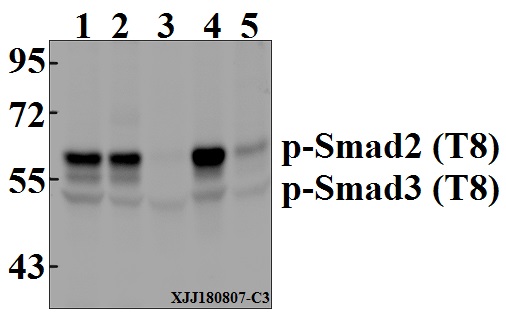Product Name :
Smad2/3 (phospho-T8) polyclonal antibody Background :
Smad proteins, the mammalian homologs of the Drosophila mothers against decapentaplegic (Mad), have been implicated as downstream effectors of GFβ/BMP signaling. Smad1 (also designated Madr1 or JV4-1) and Smad5 are effectors of BMP-2 and BMP-4 function, while Smad2 (also designated Madr2 or JV18-1) and Smad3 are involved in TGFβ and activin-mediated growth modulation. Smad4 (also designated DPC4) has been shown to mediate all of the above activities through interaction with various Smad family members. Smad6 and Smad7 regulate the response to activin/TGFβ signaling by interfering with TGFβ-mediated phosphorylation of other Smad proteins. Product :
Rabbit IgG, 1mg/ml in PBS with 0.02% sodium azide, 50% glycerol, pH7.2 Storage&Stability :
Store at 4°C short term. Aliquot and store at -20°C long term. Avoid freeze-thaw cycles. Specificity :
p-Smad2/3 (T8) polyclonal antibody detects endogenous levels of Smad2/3 protein only when phosphorylated at Thr8. Immunogen :
Synthetic phosphopeptide derived from human Smad2/3 around the phosphorylation site of Threonine 8. Conjugate :
Unconjugated Modification :
Phosphorylation
Smad2/3 (phospho-T8) polyclonal antibody Background :
Smad proteins, the mammalian homologs of the Drosophila mothers against decapentaplegic (Mad), have been implicated as downstream effectors of GFβ/BMP signaling. Smad1 (also designated Madr1 or JV4-1) and Smad5 are effectors of BMP-2 and BMP-4 function, while Smad2 (also designated Madr2 or JV18-1) and Smad3 are involved in TGFβ and activin-mediated growth modulation. Smad4 (also designated DPC4) has been shown to mediate all of the above activities through interaction with various Smad family members. Smad6 and Smad7 regulate the response to activin/TGFβ signaling by interfering with TGFβ-mediated phosphorylation of other Smad proteins. Product :
Rabbit IgG, 1mg/ml in PBS with 0.02% sodium azide, 50% glycerol, pH7.2 Storage&Stability :
Store at 4°C short term. Aliquot and store at -20°C long term. Avoid freeze-thaw cycles. Specificity :
p-Smad2/3 (T8) polyclonal antibody detects endogenous levels of Smad2/3 protein only when phosphorylated at Thr8. Immunogen :
Synthetic phosphopeptide derived from human Smad2/3 around the phosphorylation site of Threonine 8. Conjugate :
Unconjugated Modification :
Phosphorylation
-
 Western blot (WB) analysis of p-Smad2/3 (T8) pAb at 1:500 dilution Lane1:HEK293T whole cell lysate(40µg) Lane2:Hela whole cell lysate(40µg) Lane3:The Lung tissue lysate of Mouse(40µg) Lane4:SGC7901 whole cell lysate(40µg) Lane5:H9C2 whole cell lysate(40µg)
Western blot (WB) analysis of p-Smad2/3 (T8) pAb at 1:500 dilution Lane1:HEK293T whole cell lysate(40µg) Lane2:Hela whole cell lysate(40µg) Lane3:The Lung tissue lysate of Mouse(40µg) Lane4:SGC7901 whole cell lysate(40µg) Lane5:H9C2 whole cell lysate(40µg)
Bioworld Biotech only provide peptides for our antibodies and do not provide additional peptide customization services.
Price/Size :
USD 368/1mg/vial
Tips:
For phospho antibody, we provide phospho peptide(0.5mg) and non-phospho peptide(0.5mg).Describe :
Blocking peptides are peptides that bind specifically to the target antibody and block antibody binding. These peptide usually contains the epitope recognized by the antibody. Antibodies bound to the blocking peptide no longer bind to the epitope on the target protein. This mechanism is useful when non-specific binding is an issue, for example, in Western blotting (WB) and Immunohistochemistry (IHC). By comparing the staining from the blocked antibody versus the antibody alone, one can see which staining is specific; Specific binding will be absent from the western blot or IHC performed with the neutralized antibody.Formula:
Synthetic peptide was lyophilized with 100% acetonitrile and is supplied as a powder. Reconstitute with 0.1 ml DI water for a final concentration of 10 mg/ml.The purity is >90%,tested by HPLC and MS.
Storage:
The freeze-dried powder is more stable. For short time at 2-8°C. For long term storage store at -20°C.
Note :
This product is for research use only (RUO only). Not for use in diagnostic or therapeutic procedures.
 Smad2/3 (phospho-T8) polyclonal antibody
Smad2/3 (phospho-T8) polyclonal antibody  Datasheet
Datasheet COA
COA MSDS
MSDS SHIP
SHIP